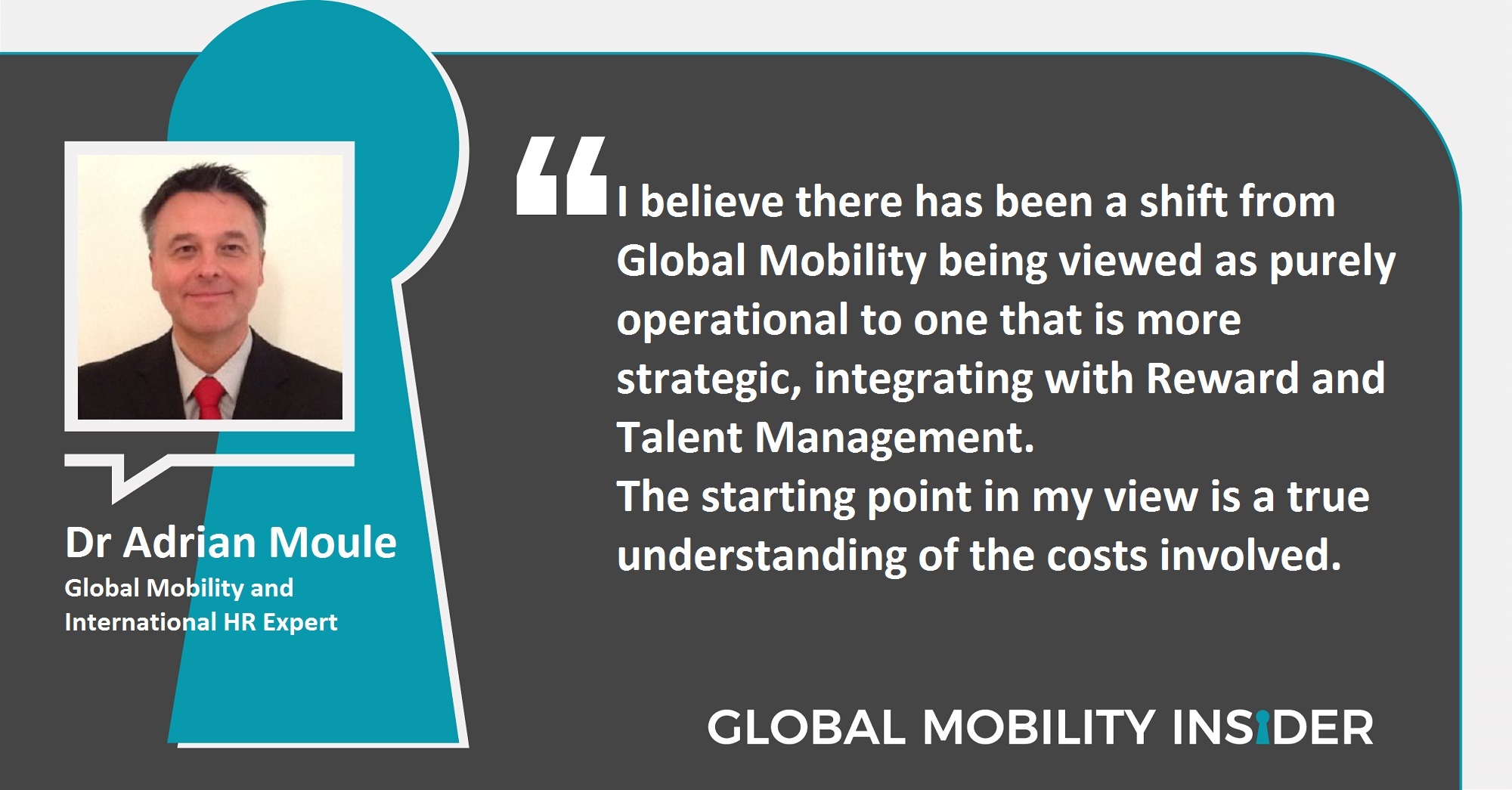Dr Adrian Moule - Global Mobility and International HR Expert
With over 20 years of managerial experience and 14 years in the HR and Global Mobility industry, Dr Adrian Moule is one of the best people to talk to regarding trends and changes in the industry. We’ve had the chance to get his insights on the developments and changes in Global Mobility as well as his personal experience and advise for people who wish to pursue careers in HR and Global Mobility.
Dr Moule is currently an independent HR consultant specialising in Global Mobility Programs. Learn more about him and his experiences in his full interview below.

Q: Can you tell us about your background and experience in HR and Global Mobility?
I came from a technical background, having had a number of roles in both Mobil Oil and BP for 13 years before I moved into HR. My break into Global Mobility came at BP in 2002 when I was asked to lead a project to look at Expatriate costs and inter-company billing. I learned a lot about the processes and costs build-ups, including all local reward programs, pensions, tax and social security costs. Moving to Mobility gave me the chance to work internationally, which had been my goal for some time.
After the project, I was asked to lead International Mobility in a geographical region including the Middle East, Russia, Africa and South Asia. This was a great role and enabled me to discuss high-level goals with business unit leaders within the region. After BP, I moved to a relocation company where we managed the logistics for Vodafone. This included assignment management, relocation, temporary housing, destination services etc.
From there I was fortunate to join Tetra Pak in Switzerland where a new Centre of Expertise had been formed. I recruited a new team, centralised operations and developed a number of policies in order to improve clarity and compliance.
I moved to Dubai in 2012 to join Baker Hughes International. As a leadership team, we were highly focused on reducing the number of expats and increasing the barrier to entry through improved governance.
My last corporate role was with Etisalat, the largest Telecom provider in the Middle East and Africa. I was given an expanded role compared to previous companies as I also had responsibility for Talent Acquisition. The mobility responsibilities were focused on developing policies, introducing new technology and improving payroll and tax compliance. There was also a strong emphasis on Talent Management and improving Repatriation processes.
Click & Like on LinkedIn
Q: What are the key networks and associations that you leverage on in the Global Mobility industry?
The good thing about the Global Mobility community is that everyone is willing to help each other. There are quite a few networks out there, and I have focused on two in particular:
I would recommend the RES Forum as a great network. There are well over 500 companies associated with RES, and it contains a number of senior mobility practitioners. You can post a question and get answers from your peers. It is a good way to benchmark and to help solve specific mobility issues you might be dealing with. They have a number of online resources and regular meetings.
I also use my networks on LinkedIn. This does require you to build up a decent number of connections first. People are very willing to help and will also put you in touch with other resources.
Q: What are the changes that you see developing within the next few years in the HR and Global Mobility industry?
I believe there has been a shift from Global Mobility being viewed as purely operational to one that is more strategic, integrating with Reward and Talent Management. The starting point in my view is a true understanding of the costs involved.
How many companies develop a fully built-up cost and then track this throughout the assignment? We talk about Return on Investment (ROI), yet there is no universal standard to measure this in Global Mobility. Some roles can probably be assigned a P&L, but most benefits are either hard to measure or intangible. Some companies see retention as a key to ROI, whereas others may want people to leave. An expatriate can cost many times that of a local so we will continue to see developments in ROI for sure.
Linked to the above is Talent Management. Companies will get smarter at selecting people for foreign assignments in terms of their suitability, assignment governance, performance management and career planning. There will be more focus on developing local talent. Talent management will start to shift from [Developed Market -> Emerging Market] to [Emerging Market -> Developed or Emerging Market] reflecting the expansion of the global economy.
Policies will also continue to develop to differentiate between leaders and developmental. Companies will consider more the ‘Push’ and the ‘Pull’ aspects of each assignment. For example, there will be no need to throw $1000’s at Millennials to take foreign assignments; they want to go!
Compliance will continue to improve with more focus on Short Term Assignments, payroll and immigration. Business Travellers will get classified under Global Mobility just to manage the compliance issues. Along with compliance, companies will work closer with their Tax Providers to look for improved Tax and Social Security optimisation. More companies will form Global Employment Companies (GECs) to manage their mobile workforce.
Q: What advice would you give to someone looking to build a career in HR and global mobility?
My advice would be to get qualified in HR. I think its fine to have non-HR experience, but to get on, CIPD or SHRM certification will be essential. It will also help to get additional certifications such as GMS (Global Mobility Specialist) or Certified Relocation Professional (CRP) in case you wish to focus on International Mobility. If you can get ‘Big 4’ experience, that will also help; and learn to speak more than one language. I would also recommend honing your EI (Emotional Intelligence) and political skills, as you may be dealing with some very senior and ‘challenging’ individuals.


Leave a Comment
* Fields marked with this asterisk are mandatory.